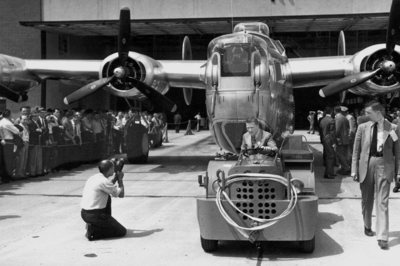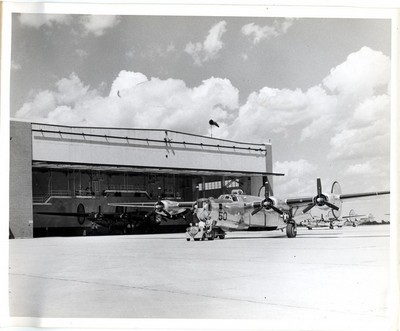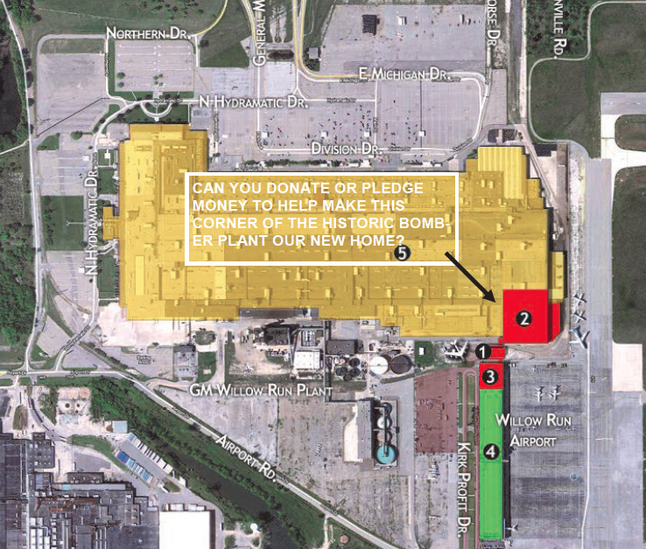As a September demolition date looms for the former Willow Run Powertrain facility in Ypsilanti Township, fundraising efforts to save a portion of the attached Willow Run bomber plant are about $4.7 million short.
With two weeks until an Aug. 1 deadline to come up with the funds, the Yankee Air Museum is pursuing large individual and company donors across the country to make up the difference.
Clik here to view.

The last Ford bomber, the B-24 "Liberator" rolls out of the Willow Run plant with Henry Ford II driving the tow in June 1945. The plant was built with an eye toward wartime production in 1940.
Eck Stanger | The Ann Arbor News
“(The Willow Run bomber plant) was the focal point of the entire arsenal of democracy,” Norton said. “Detroit won the war and we can’t let that story die.”
Should the museum fail to reach its $6 million goal, the entire bomber plant will be razed with the rest of the Powertrain facility.
Renovation too costly
The entire facility contains 4.6 million square feet and was being marketed to industrial companies for reuse by its owner, Revitalizing Auto Communities Environmental Response, or RACER, Trust.
In the wake of General Motors' ’s 2009 bankruptcy, the RACER Trust was formed by the federal government in 2011 to liquidate GM’s holdings and clean up the environmental contamination at its 89 sites across 14 states.
In Michigan, the largest of those sites is the Willow Run facility.
With the mission of helping communities hurt by the closure of the GM plants, RACER Trust has a strict set of criteria that future buyers have to meet before it can sell a property.
“We feel we only get one shot,” said Bruce Rasher, redevelopment manager for RACER Trust.
At first, most of the offers for the Willow Run plant would have resulted in companies demolishing the facility for the scrap metal and then abandoning the property, Rasher said.
After two and a half years in which they fielded 40 inquiries from interested parties but got no commitments, RACER Trust officials recently announced that the entire building would be torn down.
The Willow Run property will now be marketed to investors as vacant land — a move that Rasher thinks will make a huge difference in attracting interest.
Renovating the facility would exceed the cost of new construction, he said.
It will also be cheaper for the trust to manage in the future, as the Willow Run site was the costliest for the trust to carry since it took over 2011.
To date, $15 million has been spent to provide heat, light and security, and to pay taxes on the facility. Electric bills for the plant cost on average $75,000 to $80,000 per month, as the building is not insulated.
Rasher said one party is seriously interested in the property, though the trust continues to market it to companies in the automotive, aerospace and defense and manufacturing sectors.
Rasher has high hopes for the site, as its access to the highway, rail system, Willow Run Airport and proximity to the University of Michigan, industries in southeast Michigan and Canada make it the “crown jewel” of properties the trust manages.
The bomber plant
Clik here to view.

B-24 "Liberator" bombers roll out of the Willow Run plant in Ypsilanti Township in 1945. The bombers were produced there by Ford Motor company from roughly mid-1942 until mid-1945.
Taken by Ford Motor Company and property of Yankee Air Museum
The section the museum is trying to save is 160,000 to 180,000 square feet of the original 3.5-million-square-foot bomber plant. That portion contains the two two massive hangar doors where the new bomber planes rolled off the line and on to the tarmac.
Because the RACER Trust has been tasked with a long-term mission for the properties it controls, it is requiring the museum to front the funds for repairs for the bomber plant to ensure its success.
Norton said the trust is offering the section of the bomber plant to the museum at a “minimal cost” below the $6 million figure.
Originally, the trust asked the museum to front $8 million, Norton said.
Negotiations between the two parties dropped that to $6 million, as the trust re-engineered its demolition plan to preserve the electrical lines. Rewiring the electrical lines would have cost about $2 million, Norton said.
Norton said the total required by RACER Trust may be less in the end, as the trust is looking for ways to preserve some of the utility lines so the museum can reuse them.
“(The trust) has bent over backwards to make some changes to make this work for us,” Norton said. “They want to see this thing work. They’ve been very helpful.”
The Yankee Air Museum has established a website and an aggressive campaign in the approximate three months it was given to raise the $6 million: fliers, lawn signs and billboards have been drawn up with an image of "Rosie the Riveter" and the text “Save the bomber plant.”
- Donate online at savethebomberplant.org
“I’m very hopeful,” Norton said. “We are talking to a number of people that could put us up to that point right now I’m confident but not over confident.”
Should the museum be successful in raising the funds, it would face a continued fundraising task to pay for a new heating system and renovation costs.
The museum may also be in a position to acquire one of the four remaining B-24 Liberator bombers produced at Willow Run that are still in existence if it acquires part of the bomber plant, Norton said.
Demolition details
RACER Trust is now reviewing bids from demolition contractors and expects demolition to begin in September. Officials estimate the work will take 12 to 18 months.
Rasher declined to disclose the cost of demolition. Through the contract agreement, the contractor will pay RACER Trust a lump sum for the right to demolish the building.
The value of the scrap metal in the former Powertrain plant is high enough that Rasher anticipates it will more than pay for the cost of demolition.
The contractor will be responsible for paying for the safe disposal of asbestos insulation materials that cover most of the steam pipes throughout the building.
Razing the building will also mean that thousands of pieces of equipment still inside the plant will be sold to the contractor. RACER Trust conducted three auctions to liquidate much of the equipment inside, but not all of it was sold.
The concrete slab that forms the building’s 83-acre footprint will remain intact during demolition — a vital measure to keep the 4.1 million gallons of industrial solvents, oils and chemicals that have spilled into the ground below from being disturbed. The average thickness of the slab is 12 inches.
The building’s storm water system underneath the slab is collecting the pollution as it seeps through the groundwater. The contaminated water is piped to a water treatment plant on the property — a system that will remain in place throughout demolition, said Grant Trigger, cleanup manager.
The trust has a $35.8 million budget to address the long-term environmental contamination on the site, which will continue after the sale of the property.
Clik here to view.

The portion of the former GM Willow Run Powertrain facility -- which is colored yellow -- that the Yankee Air Museum is seeking to buy is designated with the number two and is colored in red.
Courtesy of the Yankee Air Museum
Amy Biolchini covers Washtenaw County, health and environmental issues for AnnArbor.com. Reach her at (734) 623-2552, amybiolchini@annarbor.com or on Twitter.